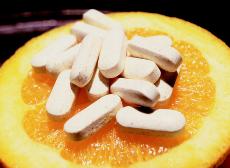One out of every two men. One out of every three women. One million Americans per year.
Unfortunately, the above statistics are not how many people win the lottery, so don’t rush out and buy any Powerball tickets yet. These facts are how many people in America are affected by cancer. One out of every two men and one out of every three women will get some type of cancer during their lives. One million Americans are diagnosed with cancer each year.
Fortunately, many cancers can be prevented just by eating. Certain foods contain nutrients that have been proven to help the body fight against cancer. According to the National Cancer Institute, nearly 35 to 50 percent of cancers are due to the foods we eat, so adopting a healthy diet is especially important at this stage in the life of a college student.
The problem comes with trying to incorporate a healthy diet into the fast-paced lifestyle of the college student. A full load of classes to balance with work and co-curricular activities doesn’t leave much time for anything outside of McDonald’s. Some argue that on-campus eateries fall into the same category so healthy options are limited for students at the University of Louisville.
Ashley Scholey, a senior communication major, said she feels there are very few healthy food alternatives on campus.
“The university says they are committed to healthier foods and healthier lifestyles, but there are limited healthy options on campus,” Scholey said.
Scholey has a family history of cancer and she has been getting yearly exams since she was 18 years old. She said she would be willing to change her diet accordingly if she knew what foods to eat.
A colorful diet of fruits and vegetables are especially vital. Carotenoids give fruits and vegetables their dark color and act as antioxidants. They also contain micronutrients, such as vitamins A, B, C and E. These nutrients work to decrease the number of chemicals in the body. They have been shown to fight off cancer, according to The Cancer Project Web site. Broccoli, carrots, and leafy vegetables, along with oranges and lemons fit into this category.
Red wine has also exhibited cancer-inhibiting properties, but should still be consumed in moderation, according to The Cancer Cure Foundation. Antioxidants known as polyphenols can be found in alcoholic and non-alcoholic red wines that neutralize free radicals that can cause disease. Resveratol, a compound present in grape skins, is also present in red wine and interferes with cell proliferation. However, alcohol has been shown to increase cancer risks as well, so drink in moderation.
Some students don’t take the time to think about the risks of cancer and the importance of a healthy diet. Such is not the case for Jared Bauman, a senior communication major. Bauman has Crohn’s disease, a chronic inflammatory condition in the digestive tract.
“I think about [getting cancer] all the time because people with Crohn’s disease are susceptible to stomach cancers,” Bauman said.
Though Bauman doesn’t know of the specific foods to prevent cancer, he constantly watches what he eats. Though he said that U of L offers Subway, a healthier alternative to fast food, Bauman believes that eating healthy is up to the individual.
“It is really up to the person because you can still put three pounds of mayonnaise on a sandwich from Subway and that isn’t eating healthy,” Bauman said.
Unlike Bauman, Derrick Johnson, a junior communication major, only thinks about the risks of cancer when someone he knows is affected by it. Johnson does not have a family history of cancer, but some of his relatives have been tested. Though Johnson admits that he might not eat very healthy, being more aware of foods that help prevent cancer will help him start.
“Anything that’s going to help me live longer I’m willing to try,” Johnson said.
So women, look to your left. Now look to your right. One of you could be diagnosed with cancer. Men, look to your left. One of you could be diagnosed with cancer. Eating right is an easy way to decrease these chances.






